As part of the EU project CANVAS, the interdisciplinary “Workshop on Ethics and Cybersecurity in Health Care” took place on the 24th and 25th of April 2018 at the TechBase in Regensburg, which offered many interesting presentations and discussions about opportunities and difficulties of value-driven cybersecurity.
The “Constructing an Alliance for Value-driven Cybersecurity” (CANVAS) project, as a Coordination and Support Action in the EU Framework Program Horizon 2020 funded by the European Union, is a consortium consisting of eleven partner institutions from seven European countries. One of the partner institutions is the Regensburg University of Applied Studies (OTH Regensburg), in which Prof. Dr. Karsten Weber, co-head of the Institute for Social Research and Technology Assessment (IST) is responsible for the CANVAS project. The consortium aims to promote a sustainable inter- and transdisciplinary discourse between different stakeholders about value-driven cybersecurity.
In order to start and continue this discourse, workshops on three application domains will be organised: health, finance and law enforcement / national security. Following health-related workshops in Geneva and Zurich, the “Workshop on Ethics and Cybersecurity in Health Care”, which took place on 24th and 25th of April 2018 at the TechBase in Regensburg, was the third and largest event. The conference was organized in cooperation with the East-Bavarian Internet and Digitalisation Network (INDIGO), the Bavarian IT Security & Safety Cluster and the Center for Digitalization in Bavaria (ZD.B).
Conflicts between cybersecurity and ethics
The event was inaugurated by Prof. Dr. Klaudia Winkler, Vice President of the OTH Regensburg, followed by a welcome address by Peter Steiert from the Bavarian State Ministry of Health and Nursing and a welcome address by Prof. Dr. Karsten Weber. CANVAS project coordinator Dr. Markus Christen from the University of Zurich (UZH) presented the project.
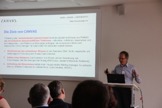
Presentation of the aims of the CANVAS project by the coordinator Dr. Markus Christen. Photo: Nadine Kleine
Afterwards, designated experts examined the field of conflict between cybersecurity and ethics from various perspectives: Corina Scheiter (technical and organisational data protection for health and social affairs at the Bavarian State Commissioner for Data Protection) gave the opening lecture; Prof. Dr. Dirk Heckmann (University of Passau) provided insights about the legal perspective on networks and automation.
David Koeppe (Vivantes GmbH), Group Data Privacy Officer, reported on his experiences with cybersecurity, data protection and ethics in clinical practice, followed by Dr. Christoph Götz (Head of Health Telematics at the Bavarian Association of Statutory Health Insurance Physicians (Kassenärztliche Vereinigung)), who discussed the various challenges of telemedicine and practical approaches to solutions. Finally, Prof. Dr. Dr. Dr. h.c. Manfred Broy (Center for Digitization in Bavaria) discussed ethical questions that generally arise with regard to digitization in medicine
The presentations were accompanied by questions from the audience that prompted a general discussion about the opportunities and challenges of the digitalization of health care.
eCare Award Ceremony
The award of the Integrata Foundation’s eCare Prize was the last highlight of the first day’s programme. Michael Mörike, Chairman of the Integrata Foundation, first outlined the foundation’s work. Thereafter, the award winners presented their works, and Prof. Weber, as a member of the foundation’s Scientific Advisory Board, held the laudatory speeches.
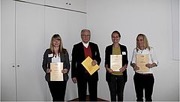
The award winners of the eCare Award: Janina Breßler (left) of the Technical University of Applied Sciences Wildau and Sandra Hobelsberger and Eva Wegerer of the Augsburg University of Applied Sciences (right). Photo: Anna Koch
This year’s award winners are Janina Breßler from the Technical University of Applied Sciences Wildau and Sandra Hobelsberger and Eva Wegerer from the Augsburg University of Applied Sciences, who received awards for outstanding theses on the humane use of information technology in nursing. The first day of the workshop ended with a reception.
Interdisciplinary Exchange of Scientific Experts
On the second day of the workshop, the focus was placed on scientific exchange, which was organised in six sessions. In parallel ran “mHealth” and “Ambient Assisted Living Systems”, “Digital Implants” and “EGK and EPA” as well as “Critical Infrastructures” and “Big Data in Health Care”. In each session, two academic and/or professional experts presented case studies that were widely discussed after the presentations and afterwards during the coffee breaks. The sessions were moderated by session chairs who summarized the most important contents of the presentations and discussions for all participants at the end of the conference.
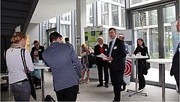
Final get-together with the summaries of the session chairs. Photo: Nadine Kleine
Parallel to the lectures, Prof. Dr. Dominik Herrmann (University of Bamberg) produced videos for a Massive Open Online Course (MOOC) planned as part of the CANVAS project. Some of the speakers and session chairs presented concrete scenarios on the basis of which students will later on be discussing ethical aspects of cybersecurity.
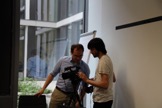
Filming for the Massive Open Online Course. Photo: Anna Koch
The discussions on the content of various areas of conflict were intensified during the breaks. The conference enabled an interesting interdisciplinary exchange and networking of various stakeholders, who – hopefully beyond the event – will continue the important discourse on value-based cybersecurity in the healthcare sector.
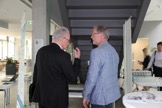
Intense discussions of the workshops participants during the breaks. Photo: Anna Koch

The next CANVAS workshops will take place on the 28th and 29th of May 2018 in Helsinki and from the 5th to the 7th of September 2018 in Bern.
